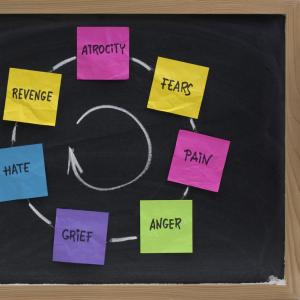
Suzanne Ross is an author, Montessori pre-school directress, Christian educator, and specialist in the mimetic theory of René Girard. She and her husband Keith founded The Raven Foundation in 2007 to increase awareness of the power of mimetic theory to illuminate the essential role played by religion in human culture since our origins. Suzanne writes from her own surprise at discovering the connection between the Montessori method for early childhood education and the hope for peace diagnosed by mimetic theory.
Posts By This Author
How to Outsmart the Father of Lies
Shortly after the election, President Donald Trump’s adviser Steve Bannon, in the context of a conversation about liberal politicians and the media’s failure to perceive the new political realities, told The Hollywood Reporter that “darkness is good.” He went on to say, “Dick Cheney. Darth Vader. Satan. That’s power. It only helps us when [liberals and the media] get it wrong. When they're blind to who we are and what we're doing."
Is Peter Thiel Scapegoating Gawker?

Image via 3faf com/Flickr
A mimetic rivalry happens when rivals who want the same thing want it more and more precisely because of the other’s desire. Thiel and Gawker, for example, would vehemently deny that they are anything like one another, and yet they want the same thing.
Immigration, Polarized Politics, and a Bear Called Paddington
Yes, We Know the Truth About bin Laden’s Death

Image via Carolina K. Smith MD/Shutterstock.com
Displayed over a blurred image of Osama bin Laden, the headline on the cover of The New York Times Magazine for October 18 reads, “Do we really know the truth about his death? The mysteries of Attobad.”
Weirdly, the article is not an investigation of the truth about bin Laden’s death — it’s an investigation of other investigations. Jonathan Mahler decided to report on two competing narratives about the raid in Abbottabad. His article is a soul-searching reflection on how we can know which version of events is true, or if the truth about our government’s actions can ever be known at all.
After reading his article, it’s fair to wonder if we ever will. If our concern is to learn the facts of the raid, we may easily get lost in a tangle of facts and lies. But that is a truth in itself — a truth of how violence works to destroy the truth.
We need to state the obvious here: the subject of all this reporting is a death by violence. The subject of this story is not the truth. The subject is violence itself.
Deadly Certainty: Pope Francis and Fundamentalism

Image via Sivadonv / Shutterstock
When we believe we are in possession of complete knowledge of God, then it endows our actions with unassailable goodness. Even actions that we condemn when performed by our opponents will appear good and noble to us when we do them. A wonderful illustration of this comes from 1 Kings 18 where we are told that Queen Jezebel, the Baal worshipper, has been “killing off the prophets of the Lord” (18:4). To demonstrate that the Lord, not Baal, is God, the prophet Elijah miraculously ignites a sacrificial fire that humiliates Baal’s prophets. Elijah then “seized them; and Elijah brought down to the Wadi Kishon, and killed them there” (18:40).
I’m not sure we are meant to applaud Elijah’s murderous rampage. I think the biblical text invites us to see the similarities between Elijah and Jezebel, despite their insistence on how different they are from one another. They are both so strongly in the grip of religious fundamentalism that they condemn each other as murderers while celebrating murder as justified by their god. Nothing can dissuade them from their belief in their own goodness, not even the blood of their victims. This is what James Alison is referring to when he says that “our self-identity as ‘good’ is one of our most sacred idols. It is one of the things that makes us most dangerous to others and to ourselves.” When we cling to our sense of ourselves as good, despite evidence to the contrary, we have turned our goodness into a sacred idol.
The Age of Peace

Image via Ilike/Shutterstock
The Great War that engulfed Europe from 1914-1918 was a bitter disappointment for the peace movement. As the 19th century came to a close, the promise of progress that accompanied Darwin’s discovery of the evolution of life on earth seemed to put peace within our grasp. “Progress” was the popular byword and always meant a movement toward something better. It was the age of invention and industrialization. Human beings were overflowing with strategies to improve the lives of the poor, the uneducated, the working class, and the least and the last among us. The women’s rights movement was flourishing as well, and Dr. Maria Montessori, the first woman in Italy to receive a medical degree (1896) was an outspoken and popular representative of the cause. But 1914 dashed all that hope.
Many are the disappointments in the world today, as well, if your goal is peace. We are witnessing the greatest number of people displaced by violence and war since the second Great War in Europe. Even so, much progress has also been made by movements advocating for the rights of groups excluded from privilege and power. Women, labor, the disabled, LGBTQ, the poor, and the sick have all witnessed their rights expand. And yet war continues. We are living in the best of times and the worst of times, it seems — a paradox that causes many of us to careen between hope and despair, unsure of how to move beyond the motion sickness.
The Imitation Game: U.S.-Iran Relations

Image via sommai damrongpanich/Shutterstock
This is basic desire psychology. The thing we won’t share is the thing we most value — and that will provoke desire in others. So what does this have to do with Iran, the so-called enemy of the U.S.? Iran may be our enemy, but its desire for nuclear weapons is, in fact, a perfect imitation of our own. I am not discounting the dangers to U.S. security if nuclear weapons get into the wrong hands. But the U.S. may risk becoming an enemy of peace as well when it blames others for desires they learned from us.
Let me be clear: Iran is no more a child than we are. We are equals, mirror images of each other’s desires for nuclear weapons and global respect. Remember, if Iran refuses to relinquish their desire for nuclear weapons, it’s not defiance — it’s imitation. And yet it may be easier than we think to find a way to make peace with this particular enemy. The path is obvious and available to us: we can renounce our desire for a nuclear arsenal.
Evidence for the Abnormality of Violence
The faces of children show us just how foreign to human nature violence actually is. Children shrink from violence. They withdraw inside of themselves, and the face they turn outward to the world is one stripped of their personalities. They lose their affect, are unable to smile or respond to overtures from others. I suppose if you think that joyless, lifeless, blank stares are “normal,” then violence can be thought of as essential to normal human functioning. But if you think that children like this are abnormal — in other words, if you think that violence has prevented them from developing normally — then it’s fair to conclude that violence is anathema to human life and therefore cannot be part of our DNA. Violent behavior must be contingent, just one possibility among others in the vast repertoire of human behaviors. One we can opt for or opt out of as we choose. A choice that a careful study of mimetic theory forces us to face.
How the 'Warrior Mindset' Has Damaged Policing, Children, and Youth
If you take human autonomy as your starting point, you lose sight of the most central characteristic of human nature: we learn who we are and how to behave from one another. How we treat children is who they will become.
This bit of wisdom has gone by many names, among them the popular notion of the “self-fulfilling prophecy.” If teachers consistently have low expectations for certain groups of kids — say, minorities or those labeled as “problem kids” — the kids will meet those meager expectations but rarely exceed them. Why? Because our sense of identity is not something we own or develop in isolation. We become ourselves in and through the significant relationships that nurture us from the cradle and envelop us as we move out into the world.
Unless We Change: Children Lead the Way to Peace
Unless you change and become like children, you will not enter the kingdom heaven. (Matt. 18:3)
Jesus spoke these words as a response to a question from his disciples. Which of us, they demanded to know, was the greatest in the kingdom of heaven. Jesus must have been struck by the contrast between his rivalrous disciples, so-called friends bickering and vying for attention, and the children who were playing nearby. He could have said, “I am, you silly gooses! Don’t compete with me – follow me!” But he had tried words before to no avail. So he summoned the children to show that greatness in the kingdom means playing joyfully in the moment with a humility that is heedless of rank or position. Only such as these, he explained, are able to know me and follow me.
Dr. Montessori’s Struggle to Balance Career and Motherhood
Maria’s choice to give up her son for the sake of her career was a difficult one for her and her son, but somehow they found forgiveness and redemption. Perhaps this is the lesson of her life. All moms know that we will make mistakes, especially in difficult situations, but Maria’s choice reminds us that the story of a mother and child isn’t over until love writes the ending.
Rape Culture on College Campuses: Advice for Survivors
Have you ever blamed yourself for some horrible thing that happened to you? When I was diagnosed with breast cancer at the age of 45, I immediately started to wonder what I had done to cause my body to betray me like that. Maybe I’d eaten the wrong foods or not taken good enough care of my health – I know it wasn’t exactly logical, but I needed to find a cause and “me, myself, and I” turned out to be a convenient target. Thank God that my pastor, now of blessed memory, responded forcefully. “Don’t even go there,” he said, shutting me down before I’d gotten more than a few words out of my mouth. “You are not to blame.” He told me that bad things happen sometimes for no good reason and I should focus on my healing and not waste energy blaming myself. That was that for me. I trusted him so much that I stopped blaming myself right then and there.
A Culture of Victim Blaming
What does this have to do with victims of rape on college campuses? Rape is a really, really bad thing and rape victims desperately want to understand why this awful thing happened to them. The news coming out of college campuses seems full of accusations and rumors of college women being victimized by their classmates. Just as I did after my cancer diagnosis, victims can make the same mistake I did and blame themselves. It doesn’t help that too often the response they get from the culture around them blames them too. The term “rape culture” is being used because it conveys that the problem of rape is compounded after the assault when victim suffering is denied and perpetrators excused. What rape victims need – especially young, vulnerable college-age women – is a response as forceful and believable to them as my pastor’s was for me. To their credit, college campuses are wrestling with finding the right combination of policies and responses to convey loud and clear, “You are not to blame.”
Counseling services and the formation of student support groups on campus have gone a long way toward removing the stigma of blame from victims. And many campuses have for years honored the risk of post-traumatic responses by including so-called “trigger warnings” on syllabuses. These warnings alert students to reading assignments, movies, or discussions that might trigger a post-traumatic response. Students can choose to opt out of those classes and/or assignments, which goes a long way toward honoring their stories and demonstrating concern for their wounds. Survivor groups have also reacted strongly when other types of triggers are not acknowledged appropriately by the university. For example, a debate on the Brown University campus about the term “rape culture” included one panelist who was likely to criticize the term, which ignited protests from a student group seeking to make the campus a safe place for rape victims. The university agreed to create a safe place on campus for victims to recover from the trauma of having their viewpoints “invalidated.”
For the Love of ‘Paddington:’ A Movie Review
I loved Paddington, the new movie based on the Michael Bonds books about an immigrant bear who arrives in London from darkest Peru. Paddington has no resources other than his faith that he will be welcomed with open arms. Sadly, his experience begins like that of most undocumented immigrants to the European or American shores – he is rejected and ignored. But this is a playful movie with a happy ending that celebrates what wonderful things happen to the Brown family when they allow Paddington into their hearts and home.
Admittedly, Paddington is a handful – a wild animal unfamiliar with modern conveniences, whose commitment to being polite does not prevent unfortunate accidents that fulfill the nervous Mr. Brown’s worst fears. As the family learns to love this accident-prone bear, however, their love for each other is renewed. The villain (yes, of course, there’s a villain!) is defeated, Paddington finds a home, and the Brown’s problems are cured by loving the alien in their midst.
Does this fictional account of immigration with a happy ending have any bearing (pun intended!) on our real world immigration crisis? This movie invites us to wonder whether our fears of the changes that immigration brings are unfounded. After all, many European and American citizens fear the waves of legal and illegal immigration in Europe and the United States. We know all too well that these uninvited guests are radically changing racial, religious, and cultural demographics. Immigrants disrupt labor patterns, burden welfare systems, and tax the criminal justice system. And unlike the movie’s cartoon explosions, floods, and fires, the violence in our world that seems fomented in and among immigrant communities is all too real a threat.
Or so the story goes that stokes our fears. But is the story true?
4 Things You Need to Know About Terrorism and Religion
After my article on the terrorism in Paris last week, readers offered some thoughtful critiques of my position. Their comments zero in on the difficulty inherent in sorting out responsibility for violence without blaming victims or excusing perpetrators. My effort, however flawed, in analyzing this instance of violence had one goal in mind: to discredit our methods for justifying violence. What seems to have elicited the most concern is my use of the image of a dragon to discuss René Girard’s concept of the sacred. I pointed out that the editors at Charles Hebdo unapologetically embraced radical secularism. They believed that sacred structures are not only as dead as a mythical dragon, but that they have no function in modern society. I begged to differ, not because I am a fan of the archaic sacred, as Girard calls it, but because I am extremely concerned that continuing to remain ignorant of the way it functions in modern society is the greatest global threat we face today. Here are four things you need to know about the relationship between the archaic sacred and violence and how that relationship threatens our world:
1. Categorical Confusion
The archaic sacred is also called the false sacred because it generates a world in which false differences appear to be true. We see this dynamic clearly in the actions of terrorists who believe in a false difference between legitimate targets for violence (Western secularists, for example) and victims of violence who must be avenged (their religious and national compatriots). We easily condemn them for justifying their own violence with self-righteous fervor. Trying to expose the difference humans have constructed as categorical lies is the driving force behind our work at the Raven Foundation.
Let me be clear: No human being is a legitimate target for violence, period. To say otherwise is indeed to blame the victim and excuse perpetrators. However, to defend victims of violence by glorifying their deaths or sanctifying the values that apparently got them murdered is to play into the hands of the archaic sacred. Why? Because by explaining why these victims did not deserve to die, we indirectly acknowledge the possibility that some victims might indeed deserve what they get. In other words, the victims of the Paris terrorism are not to be mourned because they were good, noble, or saintly people. It wouldn’t matter if they were liars, cheats, and murderers – no one needs to earn the right to NOT be murdered. To hang on to the difference between those who deserve to die and those who don’t is to hang on in confusion to a false difference that serves only one purpose – to sanctify violence and ensure its continued presence as a plague in our world.
The Violence at Charlie Hebdo: A Sacred Tragedy
What is the sacred? The sacred has been around since the beginning of human history and, according the great French thinker René Girard, it is the reason humanity has a history at all. Girard defines the sacred in a way that encompasses archaic sacrificial religions and diagnoses modern violence. He contends that the sacred is any belief that creates identity and cohesion within a group over and against outsiders. In others words, the sacred protects a community from its own violence by designating the proper enemies one can hate, ridicule, satirize and kill without remorse. Indeed, to do so is a sacred duty. By hating and killing others, we strengthen our love for members of our own group. If you recognize this as what we now call scapegoating, you are correct.
The Oracle of Certainty: From Ancient Athens to ISIS
Thank the gods we don’t believe in the utterances of oracles anymore. We don’t search for omens in the entrails of sacrificed animals or believe that women in drug-induced trances can foretell our destiny. Because the ancient Greeks fell for this superstitious mumbo jumbo, they were led into two disastrous wars that had devastating consequences. The great anti-war playwright Euripides offers his critique of wars and oracles in his play, Iphigenia at Aulis, now playing at the Court Theater in Chicago. My talented friend Jeanne T. Arrigo is in the chorus of this production and I have her and the Court Theater to thank for bringing this ancient gem to my attention.
Two Oracles, Two Devastating Wars
Iphigenia at Aulis was first performed a year after Euripides’ death in 406 B.C.E. He wrote it in response to Athens’ nearly 30-year war against Sparta. Known as the Peloponnesian War, it ended in 404 B.C.E. with Athens’ surrender, her fleet destroyed, and the city starving after a four-month siege. Euripides felt that part of the reason Athens went to war in the first place was that the Oracle at Delphi had predicted victory “if they did their best.” Not only did this encourage the outbreak of the war, but it probably made a negotiated settlement impossible. Because why would anyone cease the pursuit of victory if victory has been assured? The Oracle’s prophecy lent an aura of inevitability to the outcome of the war, which in effect robbed the Athenians of their agency. They marched to war like automatons in service of the gods.
To convince Athenians that they were on a path of self-destruction, Euripides dramatized a scene from the beginning of a previous bad military adventure, the Trojan War. As the Homeric story is retold by Euripides, the Greek armies are assembled in the port city of Aulis. Agamemnon is their general, ready to lead a thousand ships to attack Troy to recover Helen, who has run off with young Paris of Troy. The nation has mobilized to avenge this insult to Helen’s husband, Menelaus (Agamemnon’s brother) and all of Greece.
Unfortunately for Agamemnon, there is no wind. The soldiers soon tire of waiting and, despite their war lust, they are threatening to go home. But an Oracle has foretold that Artemis will raise the winds and bring certain victory on one condition: that Agamemnon sacrifice his daughter Iphigenia to her. Under pressure from the troops and his own lust for glory, Agamemnon sacrifices his daughter and the thousand ships are launched. The war is on, and the play ends with the fleet sailing eagerly across the sea.
From 9/11 to ISIS: Resolving the Paradox of the U.S. War on Terror
It’s been 14 years since our government declared war on terrorism. How are we doing? It feels like a disastrous game of Whack-A-Terrorist, doesn’t it? We kill one terrorist hiding in one hole, and out pops another one from another hole. Now we are facing the newest threat, a terrorist organization seeking to set up a nation-state, ISIS or IS, as its leadership prefers to be called. The Islamic State, at least, would be a concrete opponent. If they hold on to territory and establish a functioning government, we could at least declare war on a tangible target. Though regrettable it would at least make sense within the logic of war in which states fight other states.
In a recent article for Patheos.com, David French uses Christian Scripture as a justification for “responding to ISIS with wrath and vengeance.” French is a lawyer, a captain in the U.S. Army Reserve and senior counsel at the American Center for Law and Justice. He claims that, according to the Apostle Paul’s letter to the Romans, while individuals are called upon to love their enemies, there is no such call placed on governments. In fact, God has instituted governmental authority in order to execute his wrath against evildoers. And apparently, or so Romans 13 puts it according to French, to know who the evildoers are one simply needs to look at who governments are punishing. French quotes the relevant passage, Romans 13:3-5:
For rulers hold no terror for those who do right, but for those who do wrong. Do you want to be free from fear of the one in authority? Then do what is right and you will be commended. For the one in authority is God’s servant for your good. But if you do wrong, be afraid, for rulers do not bear the sword for no reason. They are God’s servants, agents of wrath to bring punishment on the wrongdoer. [Emphasis added by French.]
French concludes that American Christians should have no difficulty determining the correct response to ISIS. Why? By the fact of determining that justice must be executed against ISIS, our government has determined that their violence is not only an offense against American citizens (he names the beheading victims, journalists James Foley and Steven Sotloff) but against God himself.
French’s analysis strains credulity. Doesn’t he realize that the Romans to whom Paul was writing were themselves victims of government persecution? Does he think that these persecuted Christians felt they were being justly punished? And what about Paul himself, a Roman citizen who was persecuted and executed by the Roman government? Doesn’t French realize that by his own argument, the Roman authorities were executing God’s judgment against Paul? And by his own analysis, French is a captain in a military force that is from its origins a justifiable target for God’s wrath. Why? Because the founding act of the United States was a rebellion against a government, and “whoever resists authority resists what God has appointed, and those who resist will incur judgment.” (Romans 13:2)
Hobby Lobby, Rivalry, and Choosing Grace
It is an identical claim to moral superiority which matters and which is in fact the cause of the apparent conflict. The underlying issues, whatever you think they may be, whether religious freedom, women’s reproductive rights, creeping restrictions on abortion or loosening of civil rights protections—all these issues are things we can talk about and solve together through discussion and compromise. ...Unless we begin from a position that says, "We refuse to talk with you or compromise."
The Bible is Not A Myth: God’s Patience with a Tone Deaf People
I don’t know where God gets the patience. We are absolutely the most difficult people to communicate with! As the Letter to the Hebrews begins, “Long ago God spoke to our ancestors in many and various ways by the prophets.” Many and various ways – thank you, God, for trying everything you could think of to get through to us. And then, as Hebrews continues, “in these last days he has spoken to us by a Son.” And not just any, run-of-the-mill offspring. No! This Son was “appointed heir of all things,” by God, “through whom he also created the worlds.” Sending such a magnificent messenger means nothing less than a passionate desire to be heard: I AM SENDING YOU MY SON, THE ONE THROUGH WHOM I DO MY GREATEST WORK TO SHOW YOU WHO I AM! IS ANYONE LISTENING??
That was two thousand years ago and still God has not abandoned hope. At least I think God hasn’t! Which is so like God. But what is so not like us is that finally, tentatively, it appears that we are beginning to get the message. At least a part of the message that has not gotten through to us before. A Spirit of renewal has been moving through Christianity. New meanings are being discovered in Scripture, meanings that are so strange and unnatural to us that they could only have come from God. Or should I say, that they could only have been coming from God for a long, long time until we finally developed ears to hear.
Maleficent the Feminist? A Cautionary Tale
If the new Disney Studios movie Maleficent is, as some are saying, a feminist attempt to redeem images of weak and powerless women in fairy tales, then it is a cautionary tale. Feminism has always been its own worst enemy when it strives to create women in the image of men rather than encourage women to abandon rivalry with men and seek their flourishing elsewhere. This is a story about the redemptive power of a mother’s love. I wonder how many feminists will embrace that message?





![Maria Montessori, By Unknown (Bain News Service, publisher) [Public domain], via Wikimedia Commons By Unknown (Bain News Service, publisher) [Public domain], via Wikimedia Commons](https://sojo.net/sites/default/files/styles/large_square/public/blog/Maria_Montessori.jpg?itok=d-puB0gl)








